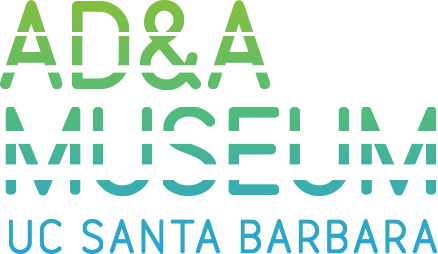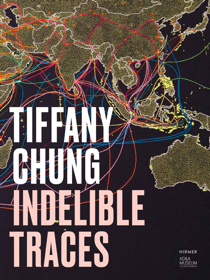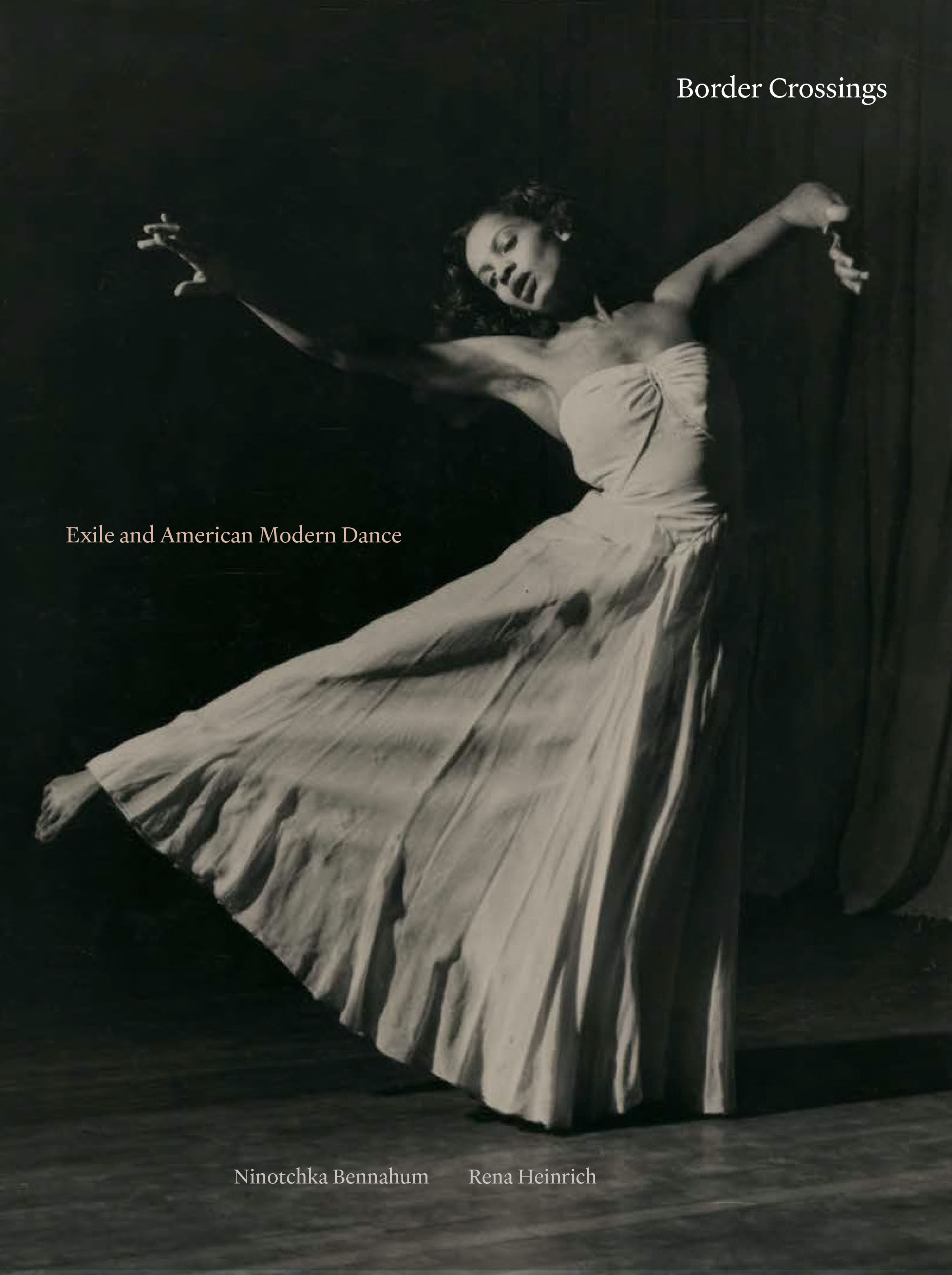Tiffany Chung: indelible traces
- Authors: Orianna Cacchione, Tiffany Chung, Heidi Amin-Hong, Mark Bradley, Erik Harms, Sarah Newman
- ISBN 978-3-7774-4686-8
- Published 2025, Hirmer Publishers
- 208 pages, 120 illustrations, 23.5 × 30.5 cm / 9 × 12 inches, Hardcover
- $55 plus tax/ship
Lavishly illustrated, this is the first scholarly monograph to provide a comprehensive introduction to the multi-disciplinary artist’s work over the last twenty-five years. Best known for her extraordinarily drawn or embroidered maps, Chung’s artwork pointedly reveals histories that have too often been overlooked or intentionally ignored.
Tiffany Chung: indelible traces excavates the complex, hidden entanglements that shape landscapes, built environments, international conflicts, trade routes, and human migration. Chung’s archival research fills in the gaps that official records overlook or intentionally disremember to reveal systems of power and cycles of transformation. Multidisciplinary scholars frame her artworks within the interconnected themes of exodus and diaspora, memory and history, mapping and excavation, and climate and conflict.
Hiruko and the Puppeteers: A Tale of Sea Wanderers
- Authors: Hanazaki Kohei, Kobayashi Hiromichi, Rebecca Jennison, Ota Masakuni
- ISBN 978-4-7738-0908-4 C0071
- Published August 2009, Gendaikikakushitsu
- Includes region-free DVD
- $35 plus tax/ship
Keith Puccinelli: The Wondercommon
- Author: Keith Puccinelli; Contributors: Maltz Gallery
- ISBN 9780930209162
- Published April 2008
- $20 plus tax
For his Los Angeles debut, Keith Puccinelli has created a compelling, insightful, and emotionally charged body of work for Otis’ Ben Maltz Gallery. For the catalog, we decided to stretch beyond the scope of the exhibition and provide a historical context for Puccinelli’s sculptures, drawings, videos and installations. The book begins in 1998 with his first site-specific happening II Kaboom Grosso and continues with the beautiful and detailed documentation of The Wondercommon.
Click here to purchase a copy.
Border Crossings: Exile and American Modern Dance
- Edited by Ninotchka D. Bennahum and Rena M. Heinrich
- Softcover
- ISBN 979-8-98896640-1
- Published January 2023
- $55.00 plus tax
Border Crossings challenges previous histories of modern dance to consider how War, inequality and injustice shaped 20th century performance art. This collection demonstrates how exiled or marginalized artists catalyzed modern dance—its ethos, vision and design—giving voice to crucial issues of geopolitical circumstance and structural racism.
Crossing Borders—physical, geographic, racial, artistic, spiritual—either by choice or by force, became a historical circumstance out of people's control. These crossings are woven into the grammar of 'the modern' in early 20th century dance. They are its DNA.
Click here to purchase a copy.
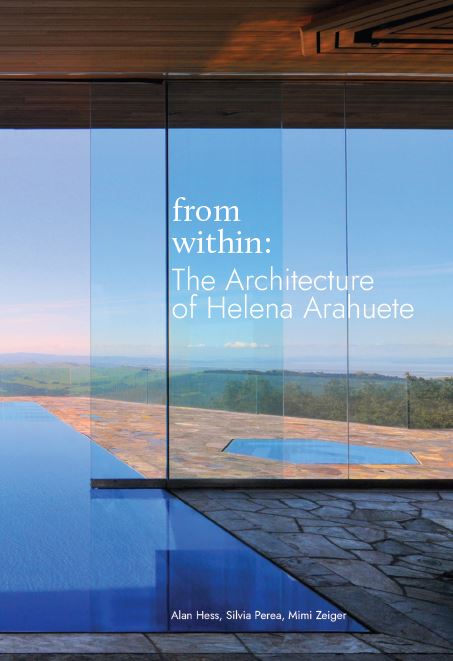
From Within: The Architecture of Helena Arahuete
- Edited by Silvia Perea
- Contributors Alan Hess, Silvia Perea and Mimi Zeiger, with an introduction by Gabriel Ritter
-
Softcover, 192 pages
-
ISBN 978-9-4914447-4-6
-
Published November 2023
-
$35.00 plus tax
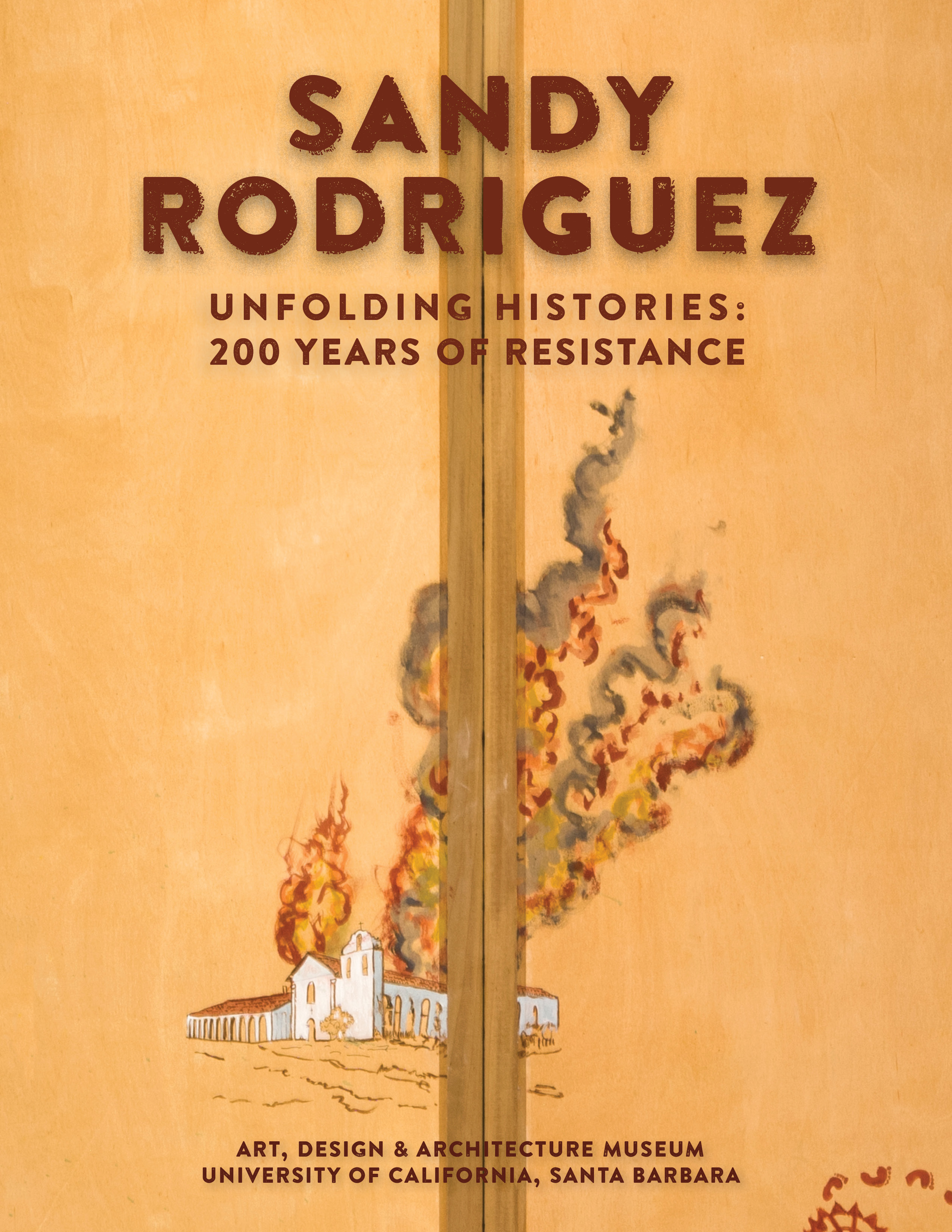
Sandy Rodriguez - Unfolding Histories: 200 Years of Resistance
- Edited by Sophia Quach McCabe
- Contributors Sandy Rodriguez, Charlene Villaseñor Black, Ella Maria Diaz, and Jonathan Cordero
- Softcover, 67 pages
- ISBN-13: 979-8-218-20935-3
- Published November 3, 2023
- $35.00 plus tax
Sandy Rodriguez - Unfolding Histories: 200 Years of Resistance features artworks by Sandy Rodriguez with scholarly essays by Charlene Villaseñor Black, Ella Maria Diaz, and Jonathan Cordero. The catalog is a potent examination of this region’s past, and present and underscores the Chumash Revolt of 1824—the largest mass uprising to take place in California during the Spanish colonial and Mexican periods. Through monumental folding screen, map, landscape painting, botanical drawing, and kinetic sculpture, Rodriguez maps the central coast of California to make visible a history of resistance in the region. The powerful essays center resistance and how Rodriguez's artworks connect its past, present, and future. Essays include Jonathan Cordero, "The 1824 Chumash Resistance at Mission Santa Barbara: A Native Narrative Yet to be Told;" Ella Maria Diaz, "Art at the End of the World: Sandy Rodriguez Is-As Twenty-First Century Testimoniadora;" and Charlene Villaseñor Black, "Unfolding Decolonial Resistance in the Art of Sandy Rodriguez."
Published on the occasion of the exhibition Sandy Rodriguez - Unfolding Histories: 200 Years of Resistance, organized and presented by the Art, Design & Architecture Museum, University of California, Santa Barbara, February 25, 2023 - March 3, 2024. The exhibition and catalog are part of Rodriguez's ongoing series Codex Rodriguez-Mondragón.
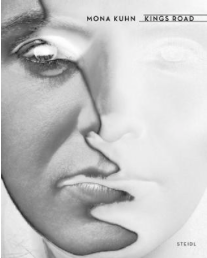
Mona Kuhn Kings Road
-
Hardcover, 160 pages, 100 images
-
ISBN: 978-3-95829-755-5
-
Published November 2021, Steidl
-
$55.00 + tax
In Kings Road Mona Kuhn lyrically reconsiders the realms of time and space within the architectural elements of the Schindler House in Los Angeles. Built by Austrian architect Rudolph M. Schindler in 1922, the house was both a social and design experiment and an avant-garde hub for intellectuals and artists in the 1920s and ’30s.
For this project Kuhn collaborated with the Architecture and Design Collection of the AD&A Museum at UC Santa Barbara, and gained access to Schindler’s private archives including blueprints, letters and notes. Alongside reproducing some of these for the first time in this book, Kuhn reinterprets the dichotomy between memory and record in a series of color photos, and solarized gelatin silver prints, a technique favored by the Surrealists. The enigmatic subject of her solarized pictures is a fictional, ethereal figure inspired by a letter from Schindler to a mysterious woman. Kuhn’s impressionistic photos render this female presence physical, even as it seems to be dematerializing: fleeting images that question the very nature of photography as record.
Click here to purchase a copy directly from the publisher.
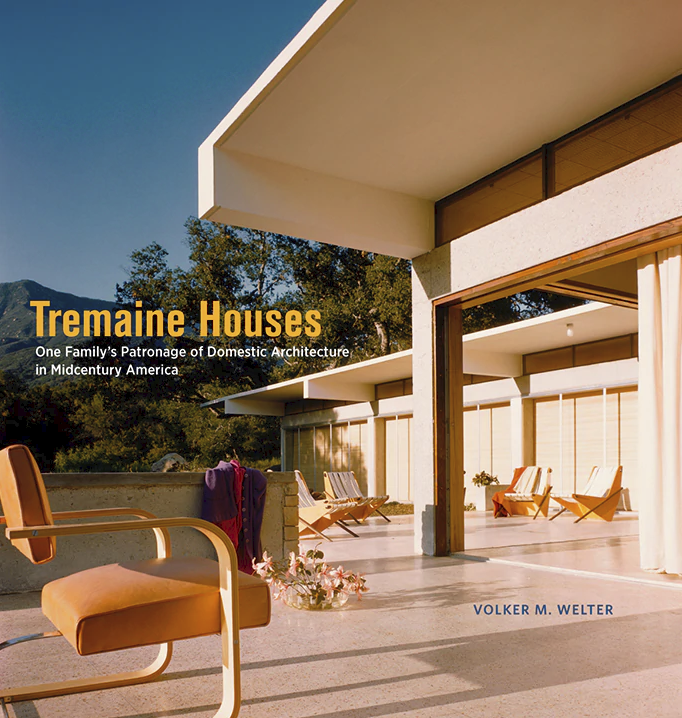
Tremaine Houses: One Family’s Patronage of Domestic Architecture in Midcentury America
-
Hardcover, 224 pages
-
ISBN: 978-1-60606-614-0
-
Published November 2019, Getty Publications
-
$55.00 + tax
From the late 1930s to the early 1970s, two brothers, Burton G. Tremaine and Warren D. Tremaine, and their respective wives, Emily Hall Tremaine and Katharine Williams Tremaine, commissioned approximately thirty architecture and design projects. Richard Neutra and Oscar Niemeyer designed the best-known Tremaine houses; Philip Johnson and Frank Lloyd Wright also created designs and buildings for the family that achieved iconic status in the modern movement.
Focusing on the Tremaines’ houses and other projects, such as a visitor center at the meteor crater in Arizona, this volume explores the Tremaines’ architectural patronage in terms of the family’s motivations and values, exposing patterns in what may appear as an eclectic collection of modern architecture. Architectural historian Volker M. Welter argues that the Tremaines’ patronage was not driven by any single factor; rather, it stemmed from a network of motives comprising the clients’ practical requirements, their private and public lives, and their ideas about architecture and art.
Click here to purchase a copy directly from the publisher.
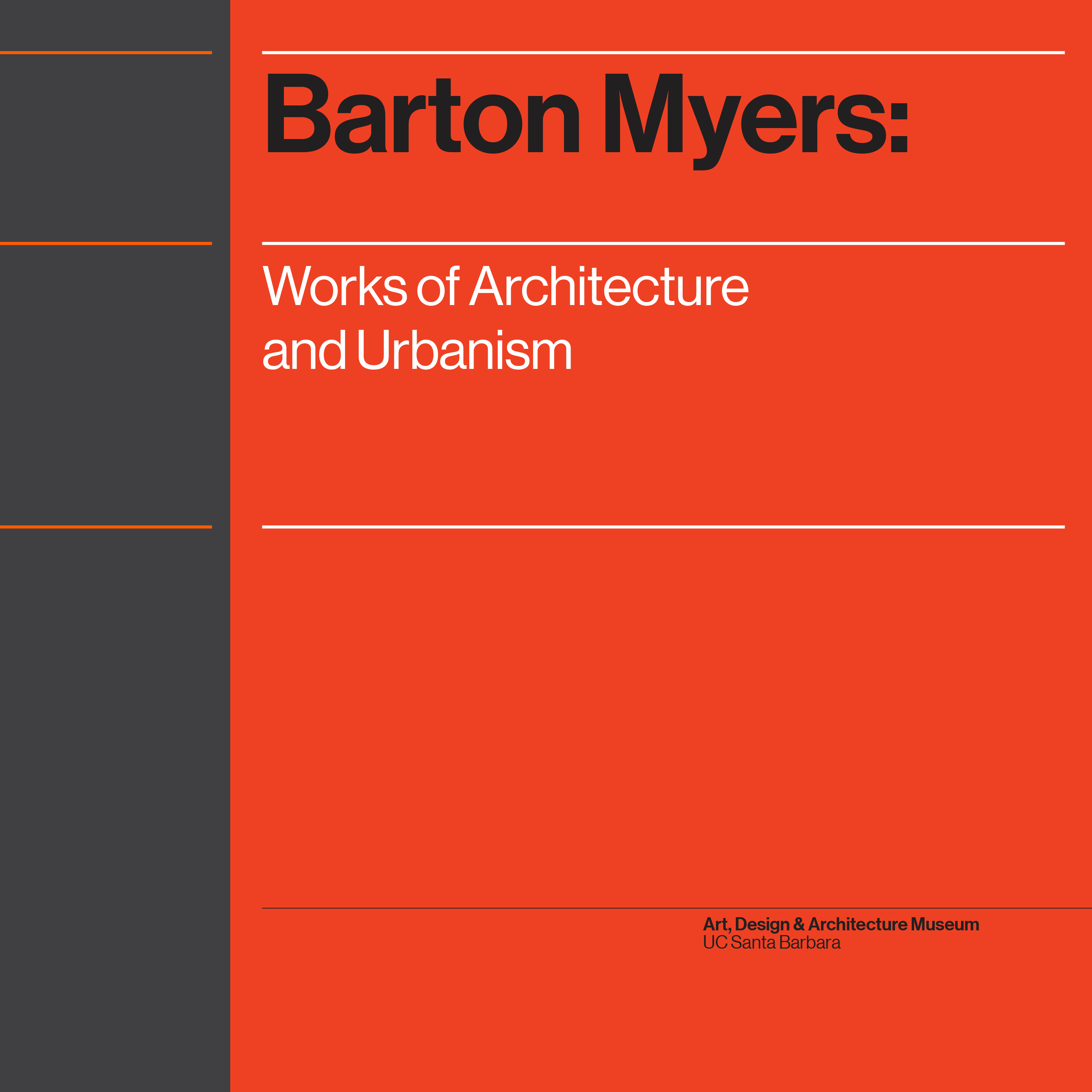
Barton Myers: Works of Architecture and Urbanism
-
Edited by Kris Miller Fisher, Jocelyn Gibbs
-
Contributors Lauren Bricker, Luis Hoyos, Charles Oakley, Natalie Shivers, Howard Shubert
-
Softcover, 126 pages
-
ISBN-13: 978-1-950192-15-1
-
Published July 5, 2019
-
$35.00
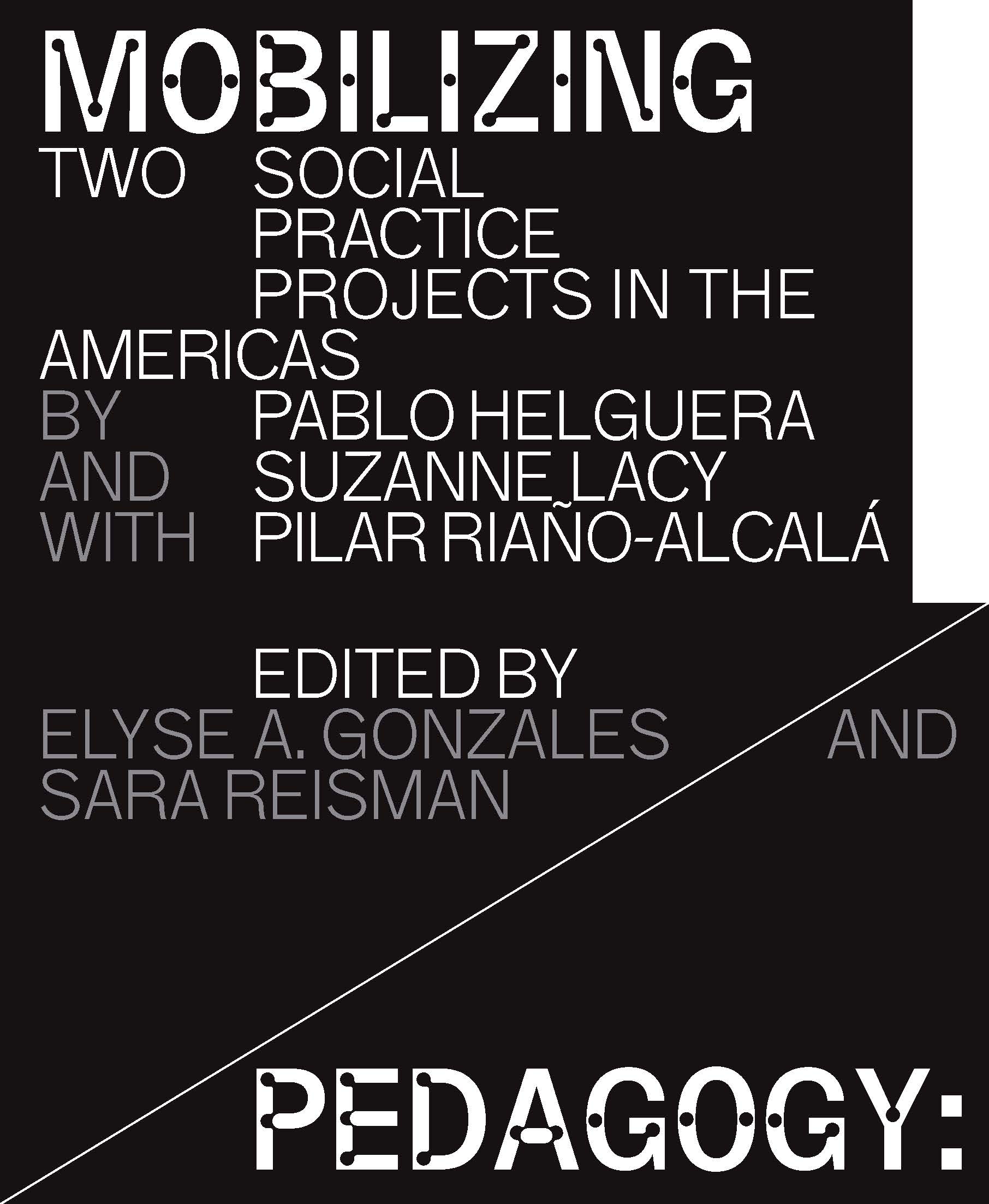
Mobilizing Pedagogy: Two Social Practice Projects in the Americas by Pablo Helguera and Suzanne Lacy with Pilar Riano-Alcala
- Edited by Elyse Gonzales and Sara Reisman
- Softcover, 97 pages
- ISBN 9781943208128
- December 2018
- $20.00
What is—what should be—the place of art in society? Is it merely decorative? Is it only to affirm a given set of cultural preferences? Or should it examine, challenge, even upend these norms to bring open new perspectives for those who experience what artists create?
Social practice artists offer a clear and unflinching answer to this question, setting before us works intended not merely to ask questions but to propose pathways toward larger societal change.
In this volume, the work of two social practice artists of different generations and different social locations—Suzanne Lacy and Pablo Helguera—are brought into creative tension by two visionary curators: Elyse A. Gonzales of the Art, Design & Architecture Museum of the University of California, Santa Barbara, and Sara Reisman of the Shelley and Donald Rubin Foundation of New York. Working together, Gonzales and Reisman bring the work of these two engaged and activist artists into dialogue, showing how art can be not merely the mirror of society but the means of making it more just, more inclusive, and more humane.
Elyse A. Gonzales is Assistant Director and Curator of Exhibitions at the Art, Design & Architecture Museum, UC Santa Barbara. While at the Museum she has curated numerous collection exhibitions and organized several group shows focused on relevant contemporary topics and the University’s distinguished alumni. She also initiated an Artist-in-Residence exhibition program, commissioning emerging artists to create new works in the Museum’s galleries. Prior to working at the AD&A Museum, Gonzales was Assistant Curator at the Institute of Contemporary Art, University of Pennsylvania.
Sara Reisman is Executive and Artistic Director of the Shelley & Donald Rubin Foundation. An accomplished curator with a deep interest in art’s potential to enact social and political change, she heads the Foundation which has most recently emphasized programming centered on art and social justice. Through grantmaking, exhibitions, and special projects, the art and social justice initiative aims to broaden artistic and cultural access in New York City toward the development of more cohesive and resilient communities and greater participation in civic life. Prior to her appointment at the Rubin Foundation, she served from 2008 to 2014 as director of the Percent for Art Program of the Department of Cultural Affairs in New York City. She has curated shows for the Queens Museum of Art, Socrates Sculpture Park, the Cooper Union School of Art, and the Philadelphia Institute of Contemporary Art, among other venues.
To purchase a copy click here. Click here for a free interactive PDF version, provided courtesy of Amherst College and The Univeristy of Amherst Press
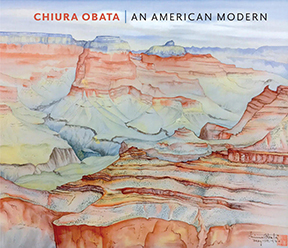
Chiura Obata: An American Modern
- Edited by: ShiPu Wang
- Hardcover
- ISBN: 9780520296541
- January 2018
- $40.00
Chiura Obata (1885–1975) was one of the most significant Japanese American artists working on the West Coast in the last century. Born in Okayama, Japan, Obata emigrated to the United States in 1903 and embarked on a seven-decade career that saw the enactment of anti-immigration laws and the mass incarceration of Japanese Americans during World War II. But Obata emerged as a leading figure in the Northern California artistic communities, serving not only as an influential art professor at UC Berkeley for nearly twenty years, but also as a founding director of art schools in the internment camps. With a prodigious and expansive oeuvre, Obata’s seemingly effortless mastery of, and productive engagement with, diverse techniques, styles, and traditions defy the dichotomous categorizations of American/European and Japanese/Asian art. His faith in the power of art, his devotion to preserving the myriad grandeur of what he called “Great Nature,” and his compelling personal story as an immigrant and an American are all as relevant to our contemporary moment as ever.
This catalogue is the first book surveying Chiura Obata’s rich and varied body of work that includes over 100 beautiful images, many of which have never been published. It also showcases a selection of Obata’s writings and a rare 1965 interview with the artist. The scholarly essays by ShiPu Wang and the other contributors illuminate the intense and productive cross-cultural negotiations that Obata’s life and work exemplify, in the context of both American modernism and the early twentieth-century U.S. racio-ethnic relations—a still-understudied area in American art historical scholarship.
ShiPu Wang is Associate Professor of Art History and Visual Culture, Founding Faculty of the Global Arts Studies Program, and Founding Director of UCM Art Gallery at the University of California, Merced. A UCSB Art History alumnus, he is the author of Becoming American? The Art and Identity Crisis of Yasuo Kuniyoshi, and The Other American Moderns: Matsura, Ishigaki, Noda, Hayakawa.
Published in association with the Art, Design and Architecture Museum, UC Santa Barbara.
Exhibition dates:
Art, Design and Architecture Museum, UC Santa Barbara: January 13–April 29, 2018
Utah Museum of Fine Arts, Salt Lake City: May 25–September 2, 2018
Okayama Prefectural Museum of Art, Okayama, Japan: January 18–March 10, 2019
Crocker Art Museum, Sacramento: June 23–September 29, 2019
Smithsonian American Art Museum, Washington, D.C.: November 2019 - April 2020
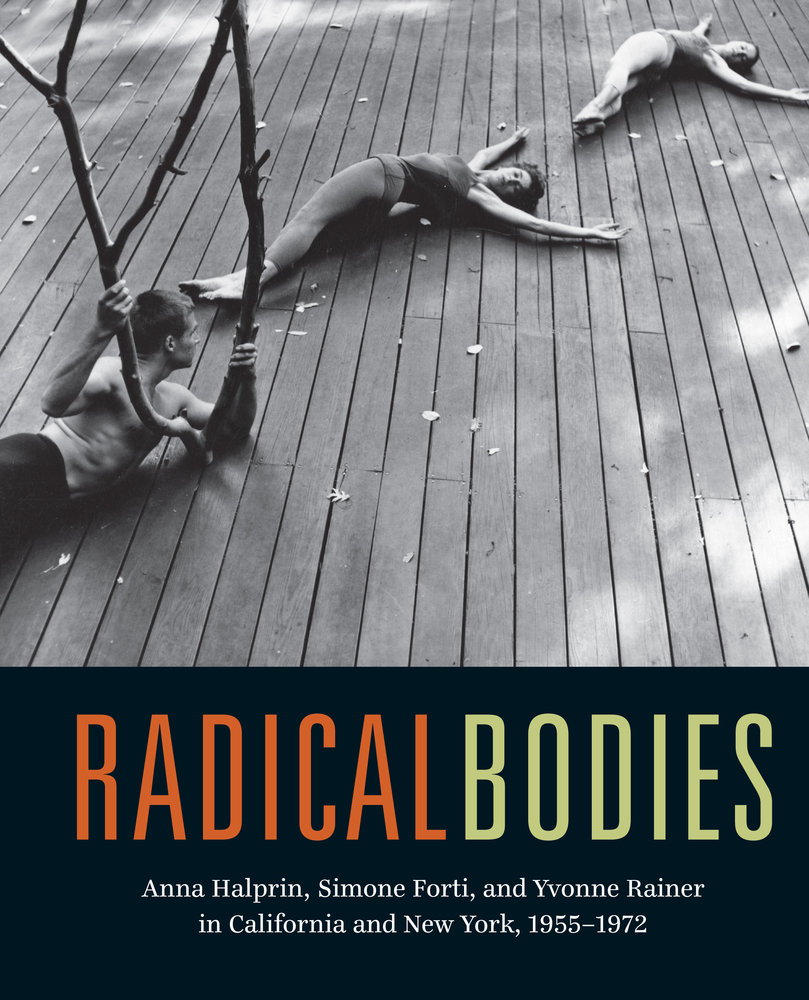
Radical Bodies
Anna Halprin, Simone Forti, and Yvonne Rainer in California and New York, 1955-1972
- Edited by: Bruce Robertson, Ninotchka Bennahum, and Wendy Perron
- Hardcover, 192 pages
- ISBN: 9780520293366
- December 2016
- $30.00
In August 1960, Anna Halprin taught an experimental workshop attended by Simone Forti and Yvonne Rainer (along with Trisha Brown and other soon-to-be important artists) on her dance deck on the slopes of Mount Tamalpais, north of San Francisco. Within two years, Forti’s conceptually forceful Dance Constructions had premiered in Yoko Ono’s loft and Rainer had cofounded the groundbreaking Judson Dance Theater. Radical Bodies reunites Halprin, Forti, and Rainer for the first time inmore than fifty-five years. Published in association with the Art, Design & Architecture Museum, University of California, Santa Barbara.
Exhibition dates:
Art, Design & Architecture Museum, University of California, Santa Barbara: January 14–April 30, 2017
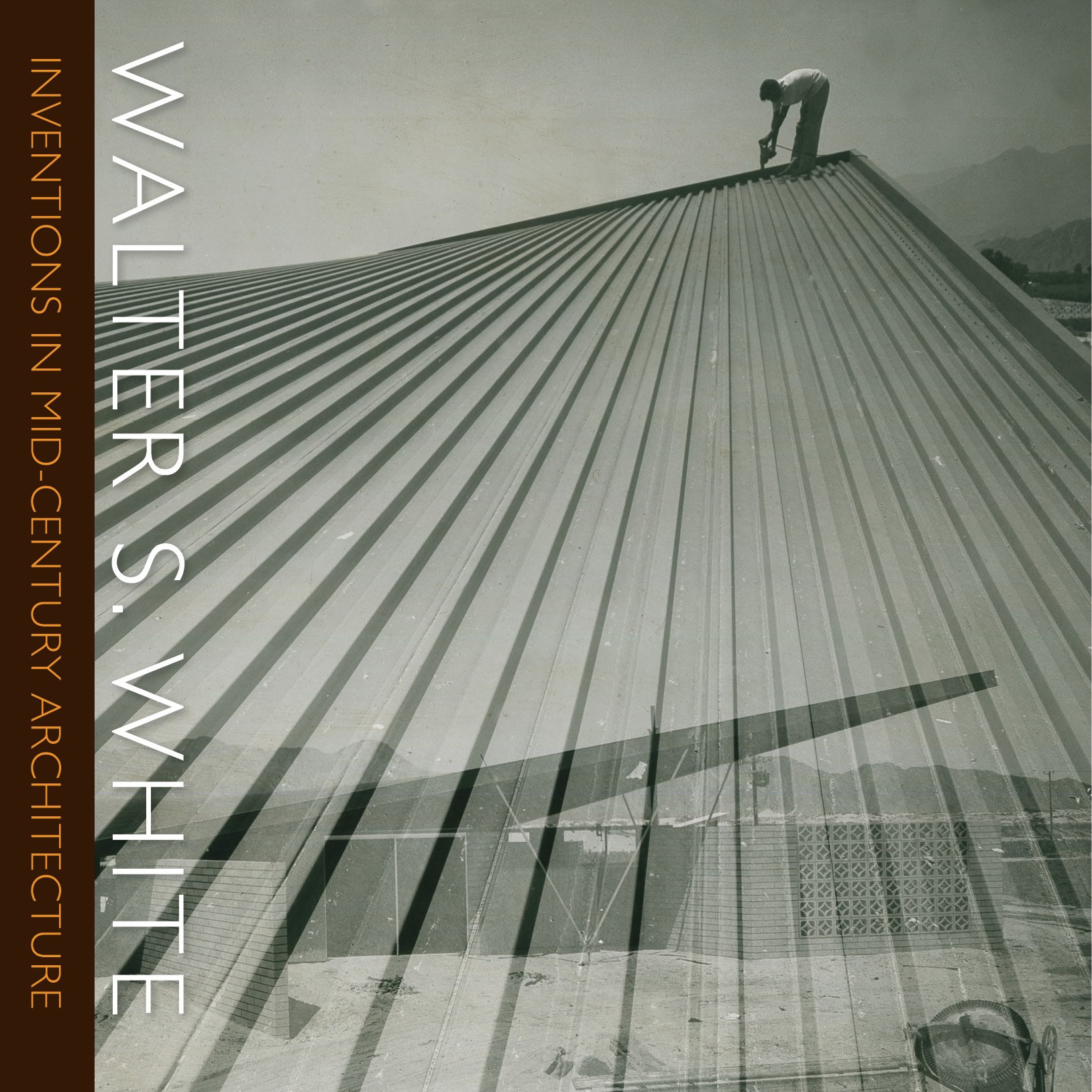
Walter S. White: Inventions in Mid-Century Architecture (OUT OF PRINT)
Written by Volker M. Welter, with essays by undergraduate and graduate students in the History of Art and Architecture Department at UC Santa Barbara
- Pub Date: January 2016
- Format: Hardcover
- Publisher: Art, Design & Architecture Museum
- Trim Size: 10 x 10
- $20.00
- ISBN: 978-0-942006-75-9
Walter S. White (1917-2002) was an ingenious inventor; builder; and architect who was propelled by three major concerns: inexpensive, even do-it-yourself domestic architecture; innovation in construction and materials; and concern for nature and the environment. This first book on White presents an overview of the architect’s career which unfolded in the Southern California desert of the Coachella Valley and the high-plateau of Colorado Springs.
The book contains essays by: Alexandra Schultz, Anthony Hickling, Katherine Kaford Papieau, Lino Pena Martinez, Willem Swart, Suzanne van de Meerendonk, and Jeff Van Voorhis.
Download a free ePub version here.
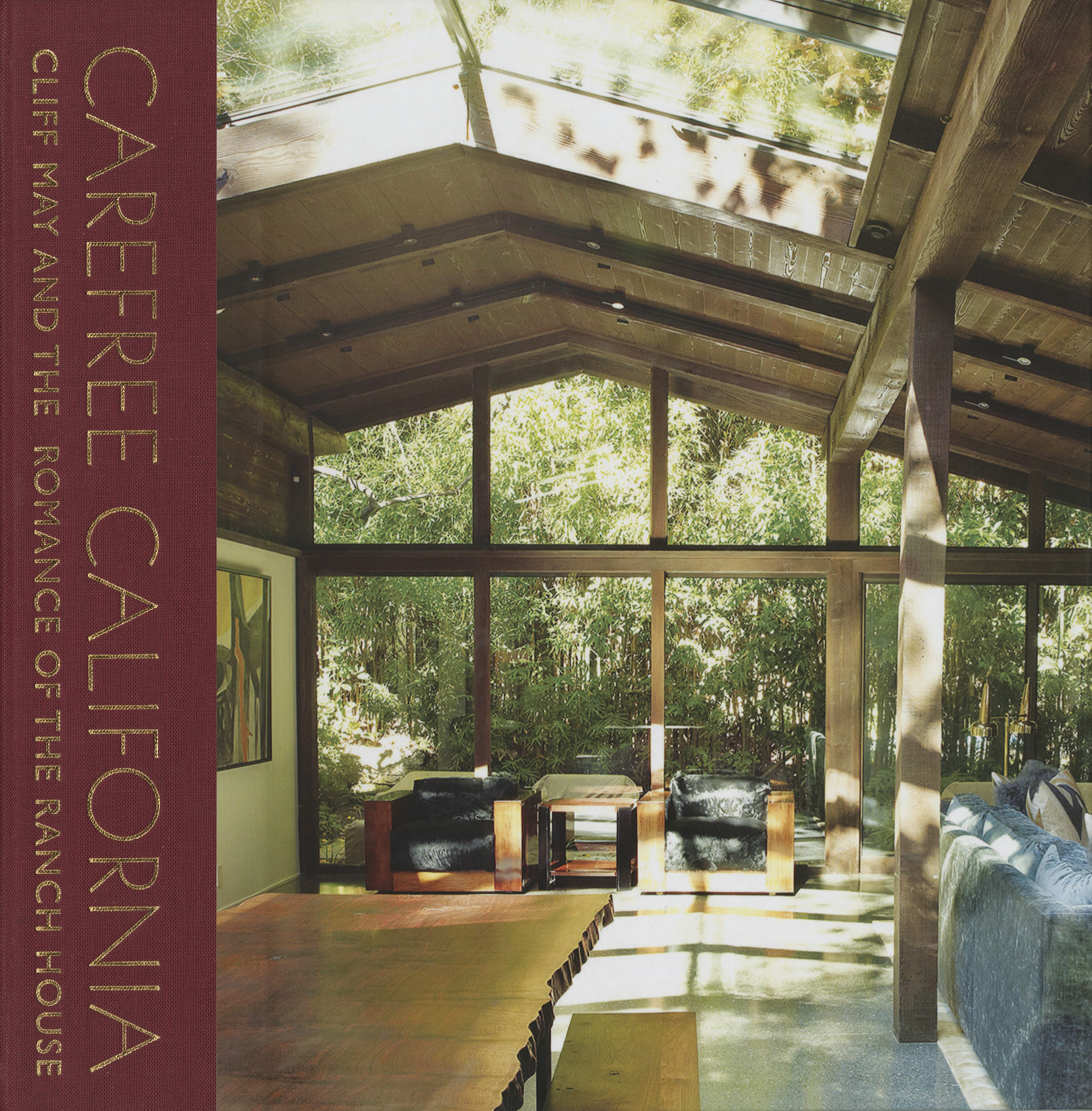
Carefree California: Cliff May and the Romance of the Ranch House
Written by Nicholas Olsberg and Jocelyn Gibbs
- Pub Date: 2012
- Format: Hardcover
- Publisher: Rizzoli
- Trim Size: 10 x 10
- $20.00
- ISBN: 978-0-8478-3782-3
This landmark volume is an authoritative, richly illustrated examination of the origins, evolution, and influence of the California ranch house. Carefree California looks at a legendary figure in Southern California design, Cliff May, and the ubiquitous domestic icon his name evokes, the ranch house. We also see how other architects—from George Washington Smith to Rudolph Schindler—pursued different paths toward the same kind of relaxed domesticity exemplified by the ranch house.
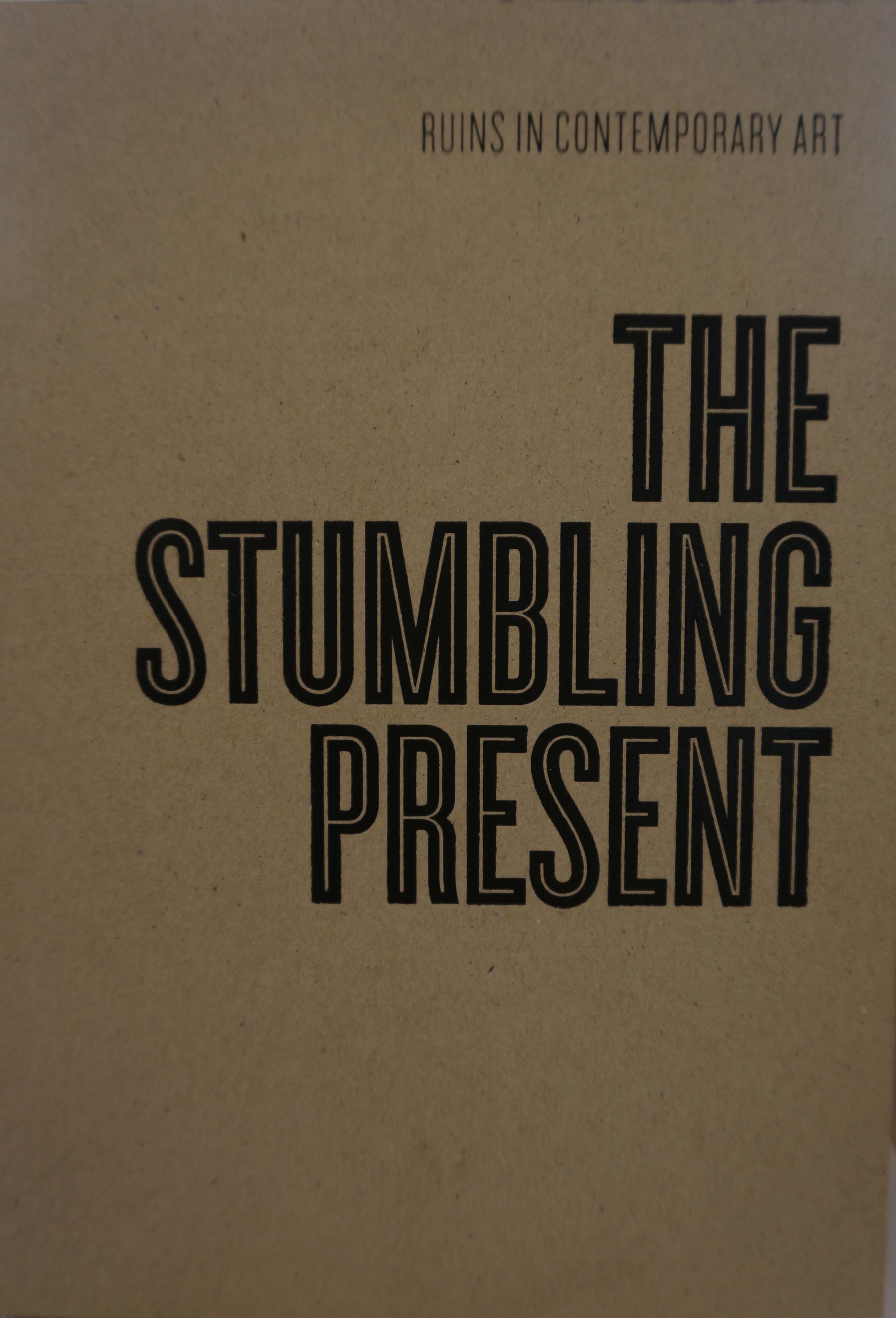
The Stumbling Present: Ruins in Contemporary Art
Written by Elyse A. Gonzales with an essay by Brian Dillon
- Pub Date: 2013
- $10.00
- ISBN 978-0-942006-76-6
This catalogue is about The Stumbling Present, an international group exhibition that examined the imagery of ruins in works of art produced since the turn of the last century. The ten artists included in the show—Lara Almarcegui, Carlos Bunga, Nigel Cooke, Adam Cvijanovic, Carlos Garaicoa, Simryn Gill, Valerie Hegarty, Kristen Morgin, Melanie Smith, and Rob Voerman—utilized neglected, willfully destroyed, or decaying places and objects to address three broadly defined themes: memory and obsolescence, failure, and transformation. These themes formed the unifying concepts of the exhibition and drove its organization. The catalogue was funded by The Andy Warhol Foundation for the Visual Arts, New York.
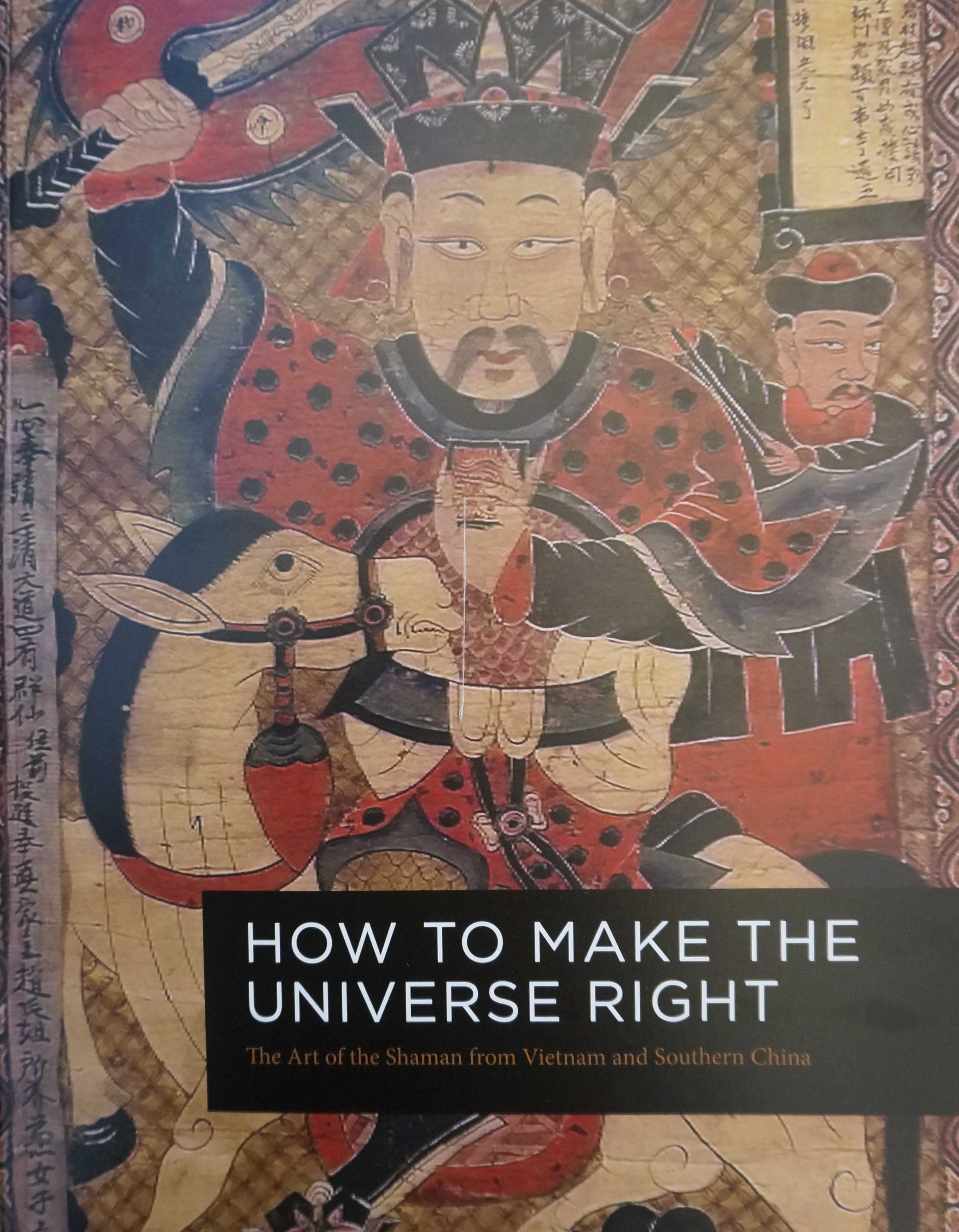
How to Make the Universe Right
- Pub Date: 2014
- Publisher: Art Design & Architecture Museum, University of California Santa Barbara
- Trim Size: 11 x 8 1/2"
- $15.00
- ISBN: 978-0-0942006-12-4
Exhibition summary catalogue featuring the collection of Barry and Jill Kitnick of Vietnamese Shamanic Art and Artifacts, with a monographic essay on the material by Asian art scholar Trian Nguyen. Richly illustrated with over 300 images. Now also available in the Museum.
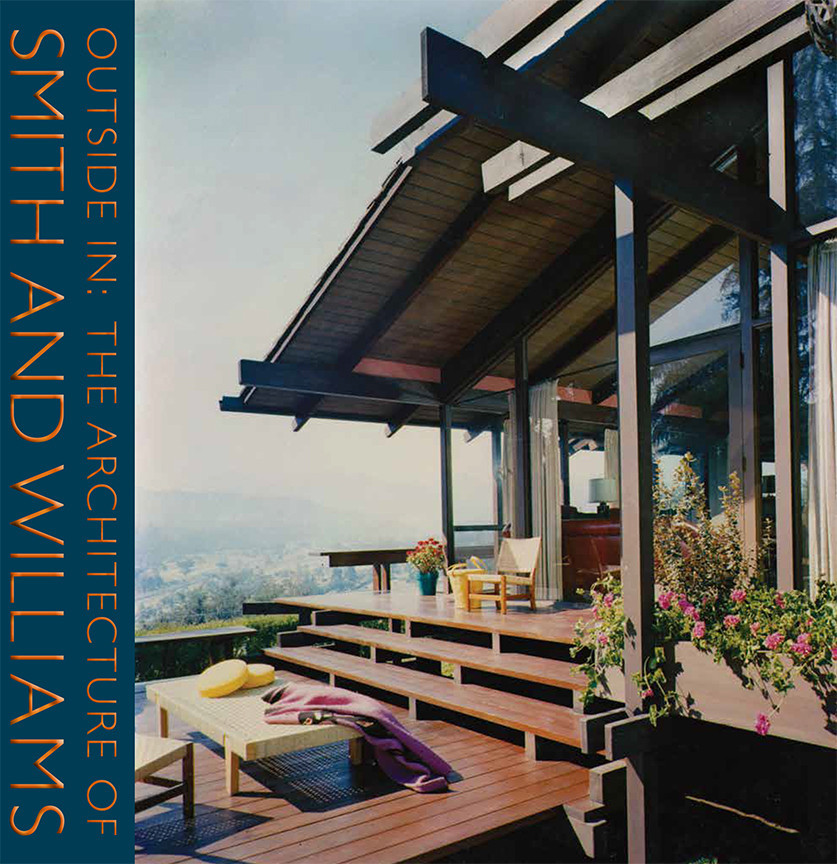
Outside In: The Architecture of Smith and Williams
Edited by Jocelyn Gibbs, with essays by Gibbs, Debi Howell-Ardila, Anthony Denzer, Lilian Pfaff, and Alan Hess
- Pub Date: 2015
- Publisher: Getty Publications in association with Art Design & Architecture Museum, University of California Santa Barbara
- Trim Size: 10 x 10, 192 pages
- US Price: $20.
- ISBN: 978-1-60606-451-1
From 1946 to 1973, Whitney Rowland Smith and his partner, Wayne Williams, designed more than 800 projects, from residential, commercial, and public buildings to housing tracts, multi-use complexes, and parks and master plans for cities. Working in the wake of the first generation of avant-garde architects in Southern California and riding the postwar building boom, their firm, Smith and Williams, developed a pragmatic modernism that, through remarkable planning and design, integrated landscapes with buildings and decisively shaped the modern vocabulary of architecture in Los Angeles.
Through a breathtaking array of images, Outside In unveils the core of Smith and Williams’s architectural practice. Their most influential designs, the authors show, are compositions of balanced opposites: shelter and openness, private and public, restraint and exuberance, light and shadow. Smith and Williams created spaciousness in their buildings by layering spaces and manipulating the relationship between structure and landscape. This spaciousness expressed modern ideas about the relationship of architecture to environment, of building to site, and, ultimately, of outside to in.
Jocelyn Gibbs is curator at the Art, Design & Architecture Museum at the University of California, Santa Barbara. Debi Howell-Ardila is an architectural historian at SWCA Environmental Consultants in Pasadena, California. Anthony Denzer is associate professor of architectural engineering at the University of Wyoming. Lilian Pfaff is the cofounder of the Foundation Architecktur Dialoge where she is also a curator and editor. Alan Hess is an architect, author, lecturer, and advocate for twentieth-century architectural preservation.
